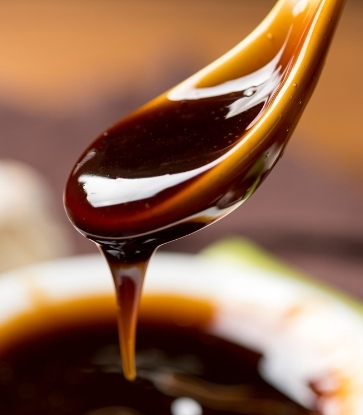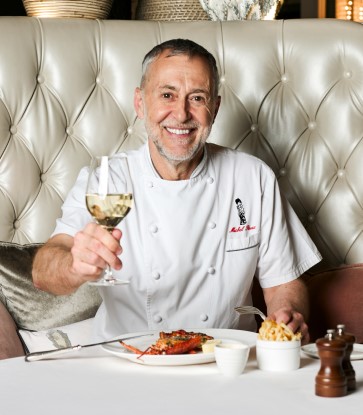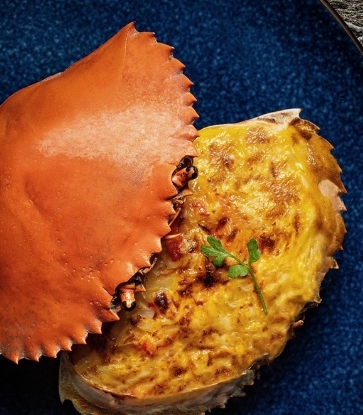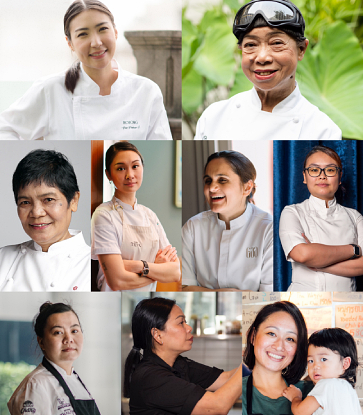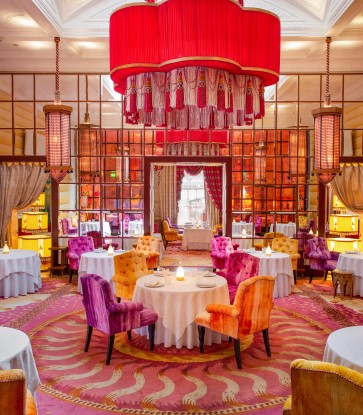When Vicky Lau struck out on her own to open her contemporary restaurant Tate in 2012, she constantly had to field questions about being a woman in the kitchen.
“I had to talk about it almost every day in the beginning, it was tiring,” she admits. “But that was because I did not realise how much of an impact this makes.”
Over time and with each media feature, Lau — the only female chef at the helm of a MICHELIN-starred restaurant in Hong Kong — noticed she was getting approached by increasingly more diners and other aspiring female chefs, who wanted to know more about her story. “I slowly realised that my sharing was helping lots of women banish negative thoughts in their head and encouraging them to come into the kitchen.”
Eight years on, the graphic designer-turned-chef has gone from shying away from emphasis on her gender to gamely embracing every conversation about it. From the dulcet gold and ballerina pink tones of her restaurant’s dining room, to the gentle kiss of Cantonese inflections in her modern French cooking and the intricate floral motifs used throughout her plating, Lau is clearly unapologetic about expressing her natural, "girly" self.
See all the restaurants in the MICHELIN Guide Hong Kong Macau 2020
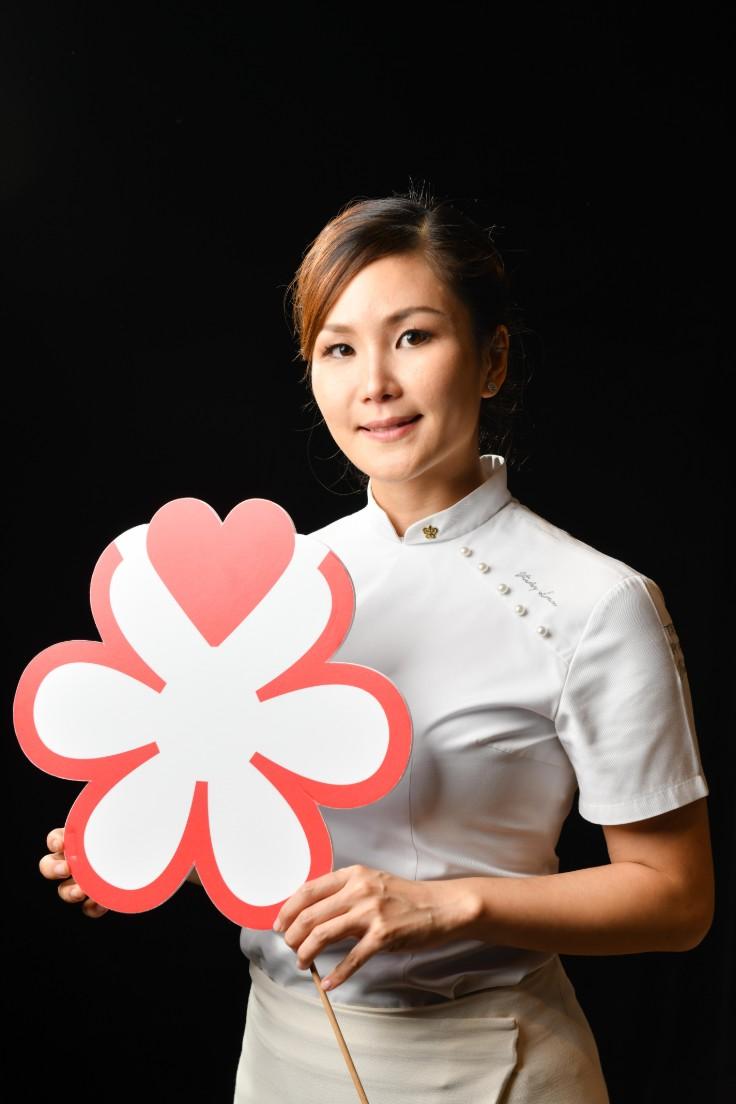
Self-expression, however, is not her only goal, it is merely her starting point. “To make beautiful and delicious food is important as a chef, but we are also looking for more meaning in life. Success is not just about yourself, but about how much you can influence society in a very positive way.”
To encourage more women like herself to speak up, Lau regularly organises collaborative dinners with other female chefs — and male ones too — to foster a community based on sharing.
“Females need to work together more,” Lau believes. “Like in a sisterhood, if we can talk to each other more, and inspire each other, we’ll be able to achieve more — because a lot of times our challenges are the same, so when we join forces together and you hear all these voices together, you don’t feel as alone. We become a lot more powerful.”
International Women’s Day has become an annual calendar highlight for Lau as an opportunity to further drive home her message. Every year, Lau and her team participate in activities to mark the global effort to celebrate the achievements of the fairer sex. Last year, she collaborated on a cocktail pairing dinner with compatriot female bartender Natalie Lau of The Old Man, and conducted a charity cooking class where the proceeds will be donated to The Women's Foundation, a non-profit organization dedicated to improving the lives of women in Hong Kong.
This year, Lau looked beyond her restaurant industry blackbook and organised a one-night-only charity dinner collaboration with seven other female personalities and business leaders from different industries, including yoga therapist Margaret Chung, consultancy founder Colleen Yu, restaurateurs Gigi Ng of Ser Wong Fun and Yenn Wong of the JIA group, wine expert Sarah Heller and media personalities Jolli Lo and Charmaine Mok. All proceeds from the dinner will be donated to Margaret Chung’s Beyond Foundation, which supports special needs children.
READ MORE: What The Restaurant Industry Will Be Talking About in 2020

On the eve of this year’s International Women’s Day, we ask Lau on her thoughts on female leadership in the restaurant industry, and why she feels no pressure to be “one of the boys”.
What drives you to want to support women?
To be honest, when I first started out in the industry I never thought about doing any of this. I never thought about women having a disadvantage in the kitchen, because I’ve never felt any discrimination. It was more because over time — after people have asked me a lot about how I feel being a woman in the kitchen and also as different female chefs or diners who want to get into the industry ask me about my story — that I started thinking that maybe there is something that we are missing in our society and there is a mismatch of a chef’s role and how it is viewed socially, so we should do something about it.
To make beautiful and delicious food is important as a chef, but we are also looking for more meaning in life. Success is not just about yourself, but about how much you can influence society in a very positive way — this is what we should all aspire to. It’s not just about being famous, about having stars or how much money we make, but it is about the positivity that we bring to our society.
“Success is not just about yourself, but about how much you can influence society in a very positive way — this is what we should all aspire to.”

How has your view on being a woman in the kitchen changed as you progressed from cooking school trainee to your first job at (now-closed) one-starred Cépage and now as chef-owner of your own restaurant?
I feel very positive about this. I was very lucky to have people who have supported me over time. I studied in Bangkok so there were quite a lot of females in the kitchen. Females love cooking in Thailand and a lot of times, they are more dominant in the kitchen. In school, about 50 per cent of my classmates were female.
When I joined Cépage, there weren’t a lot of females, but then head chef Sebastian Lepinoy (now of three-MICHELIN-starred Les Amis in Singapore) was very much a supporter of female chefs in the kitchen. He trained a lot of female chefs, and we were all very close, the pastry chefs and all the female chefs in the kitchen. Because I was given that opportunity, I feel that I should also be the one who gives opportunities to help other chefs.
RELATED: The First Day We Got Our Stars: Sebastien Lepinoy
What kind of opportunities do you think female chefs lack?
Female chefs already come in very strong, but there are only a few things I realise they do not have the opportunity to do, or perhaps are afraid to ask for or step up to receive. For example, when you offer an opportunity to a female to be a sous chef, they might think twice about it or they might doubt themselves, and think, "Can I really take on a role of managing 10 male staff in the kitchen?" So you often need to talk this through with them.

It’s more out of habit, they are not used to telling the boys what to do. In Chinese society, we are trained not to talk back to people, regardless whether you are male or female. And in Chinese culture, females are usually at home and less dominant, so they are not very used to talking to males in a more authoritative way.
This is why I try to give them that opportunity to speak up, for example, by putting them in roles where they have to tell our service team, “I want two fish now, or give me one oyster please”.
Hopefully, with these responsibilities, once they get used to doing it and become more comfortable doing it, then they will gain self-confidence.
Do you think the challenges are different for female chefs in a Cantonese kitchen?
I have not worked properly in a Cantonese kitchen, but I have done some four hands collaborations with Cantonese chefs where I got to enter their kitchens. Some kitchens are still physically not very female-friendly, in the way that some very old Chinese kitchens still have very slippery floors or the traditional woks they use may be very heavy. However, it helps that we have technology now: the equipment has become lighter, the drainage is better and the kitchen set up is better. In many modern kitchens, for example at Wing Lei in Macau and at Yi at the Morpheus, their kitchens are very friendly for females, it is not intimidating at all.
But it is all in the mind as well. If you think you can do it, there is always a way. If you can’t lift it, you can separate the food into a smaller wok and fry it for a few more times, and so on.
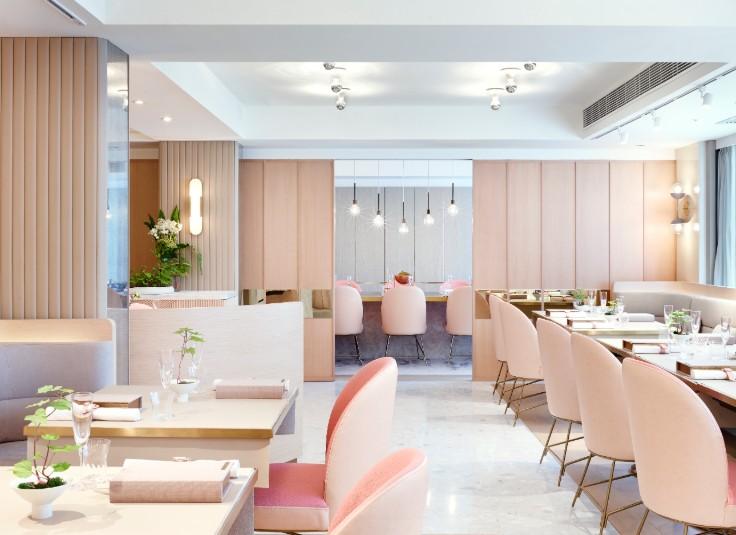
Tate is a restaurant with a very distinctly feminine touch. On the contrary, many successful chefs try to play down their feminine side to appear tougher in the kitchen. Do you not feel the pressure to be seen as “one of the boys”?
I feel comfortable just doing my style, even if it’s making Tate a little bit girly. I’m not afraid of that and I think our guests enjoy that as well, even in our plating or the way our flavours are balanced delicately. I feel comfortable doing that, I don’t feel the need to follow the trend of being a tomboy or something that is not in my character. The more important thing is to be comfortable with what you’re doing and things will gradually fall into place.
To me, toughness doesn’t come from appearances, it’s all in the mind. There were a lot of people who didn’t believe in me at the beginning of my career, but because we have been here for eight years now and we have been in the MICHELIN Guide for 8 years, we have a certain recognition and you can also see us growing and maturing over time. This shows that we are strong. It’s not just about putting up a front.
“We have been in the MICHELIN Guide for 8 years, we have a certain recognition and you can also see us growing and maturing over time. This shows that we are strong.”
Besides being a chef and owner of Tate, you’re also a mother to a daughter who is almost three, does that influence the way you guide your team and groom the younger generation of chefs?
Subliminally, for sure motherhood has changed me a lot, I often think a lot about why I had a child and my relationship with my child and how it should be. Should it be something that is forceful or more respectful of each other as a partner? I choose the latter, to be a conscious parent and likewise, to be a conscious boss and chef in the kitchen. It is more comfortable for everyone as we are all learning from each other. One cannot know everything and things evolve over time, and that’s the only way we will build a strong relationship over time and really grow together.
The culture of violence, aggression and overworking in the kitchen has become outdated. These days, it’s more about respect, because now you can learn a lot from books, TV, videos, or from testing things yourself because ingredients are a lot more available. So the meaning of an apprenticeship has shifted over time — it is no longer that your mentor is everything you have. You need to have mutual respect for each other. And to be a conscious chef and a conscious boss is to be more aware of that.

How do you find the balance between being respectful and making people listen to you so you can get things done?
It comes from self-reflection. Firstly, we hire staff who are already motivated. For me, that’s the number one thing when it comes to hiring. When I hire someone I really want to see the fire in their eyes. If it’s someone who is looking for just a job then maybe this kitchen is not the place for them.
If they have the passion, they’ll be motivated and then you just need to give some guidance and that becomes discipline and rules. If you try to force that onto someone who doesn’t have passion, it will not work.
In the end it’s about nurturing a passion they already have by explaining why we do what we do. It’s not just about setting 100 pages of rules to follow, which will just be so painful for both of us. The tasks will become very mundane everyday.
You’ve been running Tate for almost a decade now. What are the challenges female chefs still face today?
The most challenging part for chefs is still the perceived social value of our role. This is the reason why a lot of females don’t enter the industry. They view the chef’s role as something more for men, because they think “how are you going to meet a husband if you are a chef?” or maybe they worry that the kind of crowd that they will hang out with is not the best. However, the social value has increased a lot over the last decade, for sure, thanks to TV shows and accolades. You have people who want to become a chef after watching these shows, or because their goal is to have a MICHELIN star.
Do you think that’s a good thing?
The shows and awards may initially spark something in them, but to hang on in this industry, you need a lot more. You need to have the right personality and the desire to learn. But it’s nice for young chefs to have a goal, it works as an encouragement — it shouldn’t be the sole purpose but it is good to have encouragement.
Your advice for young female chefs today?
My advice for young chefs — not just females but the males as well — is to just learn as much as you can. There are so many ways to learn nowadays. Over time, being in the kitchen is not just about cooking skills, it’s also about management, so learning how to talk to people is important, especially for females, so learnt to feel comfortable doing that.
What our MICHELIN inspectors say about Tate:
Owner-chef Vicky Lau is now very much at home here in Sheung Wan, where she tells edible stories with her multi-course menu that exudes feminine delicacy and sophistication. Each dish is an ode to an ingredient, mostly locally sourced, with occasional exceptions such as Breton lobsters. Wine flights are predominantly French as is the list, but a sake is not beyond the pale either. Refined and detailed service echoes the sentiments that the food imparts.







